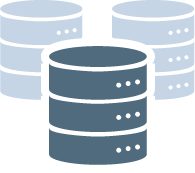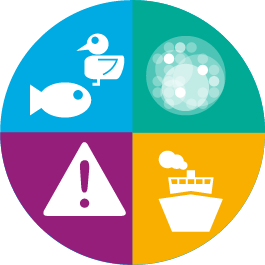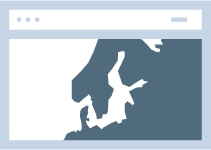Data
HELCOM collects data on the Baltic Sea into various thematic databases. This information is accessible through online data portals and services listed below.

Databases
Organized collections of thematic data. Data is typically collected on an annual reporting schedule following regionally agreed reporting formats and quality assurance procedures.
Related Baltic Sea Action Plan (BSAP) topics

Data portals
| Name | BSAP topic(s) | Description | Features |
| HELCOM Map and data service (MADS) |  | Contains all geospatial data used in HELCOM assessments and reports. Linked with HELCOM Metadata catalogue. | • View • Search • Download |
| HELCOM Metadata catalogue |  | Contains metadata records of all geospatial data used in HELCOM assessments and reports as well as in depth documentation of databases. Linked with HELCOM MADS. | • Metadata • Download |
| BASEMAPS | Basemaps provides access to maritime spatial planning (MSP) data in the Baltic Sea: ‘Input data,’ as a service from data sources, and ‘Output data,’ which is MSP plans sea uses. | • View • Metadata | |
| HELCOM Biodiversity data portal | Contains all macrospecies observations data made available by HELCOM Contracting Parties. | • View • Search • Download | |
| Shipping data platform | Provides access to various shipping-related data collected by HELCOM within the Maritime and Response Working Groups, expert groups and related projects. | • View | |
| Ballast water DST | The HELCOM/OSPAR Ballast Water Exemptions Decision Support Tool contains data on NIS species observations and port sampling. | • View • Search • Download | |
| HELCOM MPA Portal | Access point to relevant information on the Baltic Sea Protected Areas (HELCOM MPAs). | • View • Search • Download |
Databases
| Name | BSAP topic(s) | Description | Reporting format | Features | Hosted by |
| Oceanographic data (nutrients) | Oceanographic monitoring data gathered by HELCOM Contracting Parties. | Link | • Online access • Download | ICES | |
| Hazardous substances in marine environment | Monitoring data on concentrations of contaminants in biota, sediment and seawater. | Link | • Online access • Download | ICES | |
| Biological community data (open sea) | Monitoring data on abundance and biomass of open sea phytoplankton, zooplankton, zoobenthos and phytobenthos. | Link (ENV3.2), PEG Biovolume | • Online access • Download | ICES | |
| Biodiversity database | HELCOM Biodiversity database contains macrospecies observations. | • Online access • Download | HELCOM | ||
| Pollution Load Compilation (PLC) | HELCOM PLC Database contains waterborne nutrient and contaminant discharges to the Baltic Sea. | Link | • Online access • Download •Dashboard | BNI | |
| Impulsive noise | Impulsive noise events reported by HELCOM Contracting Parties. | Link | • Online access • Download | ICES | |
| Continuous noise | Continuous low-frequency sound monitored under the HELCOM programme in the Baltic Sea | Link | • Online access • Download | ICES | |
| Shipping accidents | Shipping accidents reported to EMSA/EMCIP and verified by HELCOM Maritime | • Online access • Download • Dashboard | EMSA | ||
| Illegal oil spills | Location and size of spills observed during aerial surveillance flights by HELCOM Contracting Parties | • Online access • Download • Dashboard | HELCOM | ||
| Disposal sites of dredged material | Disposal and deposit sites of dredged material reported by HELCOM Contracting Parties | Link | • Online access • Download | HELCOM | |
| Radioactive substance in the environment (MORS Env) | Observations from monitoring of environmental radioactivity in the Baltic Sea | Link | • Download | HELCOM | |
| Radioactive discharges (MORS Discharge) | Airborne and waterborne discharges resulting from nuclear facilities in the Baltic Sea and North Sea region | Link | • Download | HELCOM STUK |
Data services
The HELCOM data services provide standards-compliant methods for accessing environmental data related to the Baltic Sea. These services facilitate machine-to-machine communication, making it possible for GIS professionals, developers, and researchers to integrate HELCOM datasets into their workflows.
Data services are documented in the HELCOM Metadata catalogue and are accessible from HELCOM ArcGIS REST Services Directory as follows:
- Select a thematic service from the service directory
- Select the interface type from the top of the page (WFS / WMS / Rest)
Available service types are:
- OGC Web Feature Service (WFS) enables users to request and manipulate vector feature information from the HELCOM databases in a machine-readable format (for example, GeoJSON or GML).
- OGC Web Map Service (WMS) provides pre-rendered map images of spatial datasets directly from HELCOM’s servers.
- ESRI ArcGIS Rest interface allows direct access to HELCOM’s spatial data through ArcGIS-compatible REST endpoints.
Data tools
Software tools developed for use in HELCOM assessments are listed below and are available in the HELCOM GitHub repositories.
| Name | BSAP topic(s) | Description | Features |
| SPIA desktop tool (GitHub) |  | ArcGIS Pro toolbox to run the spatial pressure and impact assessment (SPIA) with any pressure layer and ecosystem component datasets that meet the specified requirements. | • Run assessment |
| SPIA online tool |  | Online tool for conducting the spatial pressure and impact assessment (SPIA). The newest input datasets are available, with links to corresponding metadata. Users can explore results and trace them back to contributions from human activities, pressure layers and ecosystem components. Downloadable outputs, including raster files and statistical information. | • Run assessment • Explore results • Metadata • Download |
| Sufficiency of Measures (SOM) |  | A Python model developed by HELCOM to assess the potential improvements in environmental state and pressures achievable with existing measures. | • Run assessment |
| HEAT | HELCOM Eutrophication Assessment Tool (HEAT) is used to carry out HELCOM Eutrophication assessment and indicator result calculation from monitoring data. | • Run assessment | |
| HARSAT | The Harmonised Regional Seas Assessment Tool (HARSAT) tool has been co-developed by OSPAR, AMAP and HELCOM. The tool allows data for multiple hazardous substances to be analysed, calculating station level and assessment unit trends and evaluations for indicators and assessments. | • Run assessment | |
| CHASE | HELCOM Hazardous Substances Status Assessment Tool (CHASE). The CHASE tool integrates monitoring data on hazardous substances in water, sediments and biota as well as bio-effect indicators and is based on a substance- or bio-effect-specific calculation of a ‘contamination ratio’. | • Run assessment | |
| BEAT | HELCOM Biodiversity Assessment Tool (BEAT) is used for creating integrated assessments of biodiversity in the Baltic Sea based on biodiversity indicator results. | • Run assessment |
Usage and citation
Users are free to distribute, remix, adapt, and build upon the material in any medium or format, so long as attribution is given to the creator (CC-BY license). See our data policy for more information.
How to cite: [Name of data source], [Year]. [Hosting organisation]. [weblink]
Example: Shipping accidents, HELCOM Map and Data Service, 2024. The Baltic Marine Environment Protection Commission (HELCOM), Helsinki, Finland. https://maps.helcom.fi
Contact

Joni Kaitaranta
Senior Data Manager
data@helcom.fi
+358 46 850 9206



